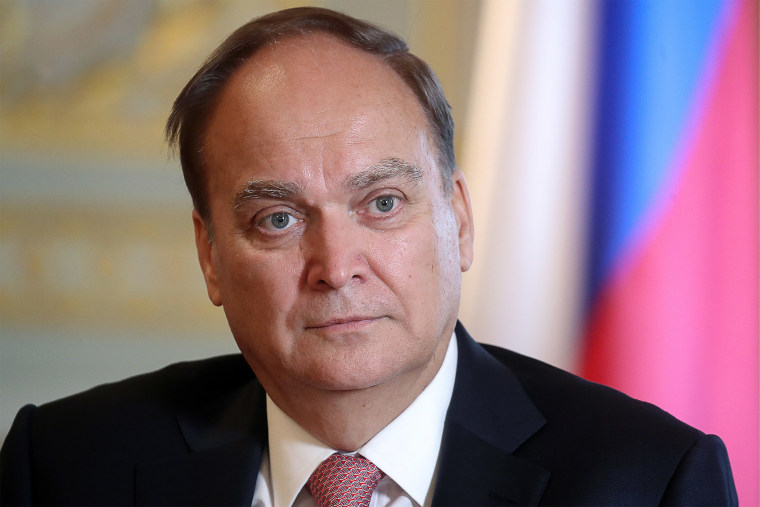Moscow responded angrily Thursday after President Joe Biden labeled Russian leader Vladimir Putin a "killer" and said he would “pay a price” for 2020 election interference.
Russia recalled its ambassador to the United States on Wednesday for "consultations" just hours after Biden's remarks, which the Kremlin later said were “very bad” and without precedent.
Asked about Biden’s comments during a video call Thursday aired on Russian state television, Putin said he wished his counterpart in Washington good health and was saying that "without irony" but charged that the comments reflected America's own troubled past.
While praising the American people, Putin said the legacy of slavery and the country's treatment of Native Americans weighed heavily on its dealings abroad.
"In the history of every people, every state, there are a lot of hard, dramatic and bloody events. But when we evaluate other people or even other governments, we always look as if into the mirror. We always see ourselves in it," Putin said.
"I remember when I was young and I got into fights with my friends, we always used to say 'whoever calls names is called that himself,'" he added.
"And that’s not just a children’s joke. The meaning is quite deep psychologically. We always see our own qualities in another person and think that he/she is like ourselves. And coming from that, evaluate his/her actions and evaluate him/her overall."
Download the NBC News app for breaking news and politics
Putin's response was delivered during a call with residents of Crimea marking the anniversary of its 2014 annexation from Ukraine. He added that Russia would still cooperate with the U.S. where it serves Moscow’s interests.
The comments came shortly after the Kremlin said Biden's remarks suggested that he “definitely does not want to improve relations" between the two countries.
"I won't be wordy in reaction to this," Kremlin spokesman Dmitry Peskov told reporters. "I will only say that these are very bad statements by the U.S. president."
Russian Foreign Ministry spokeswoman Maria Zakharova did not cite specific reasons for recalling Ambassador Anatoly Antonov on Wednesday, but the Russian Embassy in the U.S. released its own comment early Thursday blaming “certain ill-considered statements of high-ranking U.S. officials” for putting the "already excessively confrontational relations under the threat of collapse."

During Wednesday’s interview with ABC News, Biden said that Russia would face consequences for meddling in last year’s presidential election after a declassified report from the U.S. national intelligence director’s office found earlier this week that Putin authorized influence operations to help then-President Donald Trump in November’s election.
“(Putin) will pay a price,” Biden said, when asked about the report. He did not disclose what price Putin could pay, only saying, “you will see shortly.”
The Kremlin had earlier dismissed the allegations in the report as baseless.
Asked if he thinks Putin is a killer, Biden said, “I do.”
Biden also confirmed that he once told Putin the Russian leader doesn’t "have a soul." He said Putin responded to the comment, made during a visit to the Kremlin as vice president in 2011, by saying "We understand each other.”
White House press secretary Jen Psaki told reporters Thursday that Biden did not regret characterizing Putin as a "killer," saying that the "president gave a direct answer to a direct question."
Putin's response Thursday was likely made for a domestic audience, said Mark Galeotti, a professor at the University College London's School of Slavonic and East European Studies and a senior associate fellow at the Royal United Services Institute, a London think tank.
"Biden's words were unusually blunt — and he is an experienced enough politician that he would not have answered the question directly had he not wanted to do so. However, it is still unclear what it means, given that so far this administration has talked tough on Russia without following up with more than token actions."
"He could just as easily be using this kind of language to distract from the absence of serious action as to presage it."
"In that context, the withdrawal of Ambassador Antonov for consultations is as much as anything else a signal from Moscow that the USA should not push things too far," Galleotti added.
The Department of State said Wednesday that it was aware of Russia’s decision to recall its ambassador.
White House press secretary Jen Psaki said the Biden administration will take a more straightforward and direct approach in its relationship with Russia than Trump.
Relations between Moscow and Washington have been strained since Biden took office.
In coordination with the European Union, the U.S. announced sanctions earlier this month against senior members of the Russian government over the detention of opposition leader Alexei Navalny after his poisoning with a nerve agent last year.
The sanctions were the first to target Moscow since Biden became president and opened a comprehensive review of U.S.-Russia policy, including the Kremlin's actions against Navalny, interference into the U.S. election, the SolarWinds hack and reported bounties offered to Taliban-linked groups to target U.S. forces in Afghanistan.
Since Biden's inauguration, the only moment of cooperation between the two nations came when the U.S. and Russia extended a crucial nuclear arms control treaty last month.
